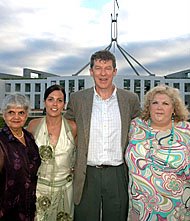
Medical heroes scoop Australia Day honours
Graham Lloyd
26jan06
A CONFIDENT Australia, at the peak of its economic power and international standing, has rewarded medical triumph and the public dedication of two Queensland nurses to celebrate its national day.
Three of the top four Australia Day honours have been awarded to Queenslanders.
University of Queensland research scientist Professor Ian Frazer was named Australian of the Year for his development of a vaccine to prevent cervical cancer.
Bundaberg nurse Toni Hoffman was named Australia's Local Hero for her work exposing Queensland's public hospitals shambles, in particular the scandal of surgeon Jayant Patel who has been linked to the deaths of 13 patients at Bundaberg Base Hospital.
North Queensland-based nurse Sally Goold joined the honour roll as Senior Australian of the Year.
Trisha Broadbridge, the widow of Melbourne footballer Troy, who died in the Boxing Day tsunami in Thailand, was named Young Australian of the Year for her work helping young people affected by the tragedy.
Celebrities Nicole Kidman and the King of Australian television, Graham Kennedy, who died last year, were recognised with Australian Day honours.
Prime Minister John Howard used a speech to the National Press Club to highlight Australia's economic and political success. He said Australia Day should be used to renew faith in "the Australian achievement".
In a provocative speech Mr Howard all but declared victory in the long-running debate over Australia's cultural and international identity.
"We do not have to smother or apologise for our place in the Western political tradition in order to build our relationships in Asia or in any other part of the world."
Mr Howard also called for "root and branch" renewal of the teaching of Australian history in schools.
Commenting on the awards, Mr Howard said they showed how the nation was moving forward in pioneering medical research.
"It is a reminder of how much this country has achieved, how it has punched above its weight," he said.
Professor Frazer pioneered a vaccine for the human papilloma virus which causes cervical cancer. His vaccine has the ability to wipe out the cancer in a generation.
Cervical cancer is the second most common cancer amongst women, with 500,000 new cases diagnosed worldwide each year.
"It's a world-first for Australia, a vaccine that can prevent a cancer, and my great aim is to make sure that is used as widely as possible, particularly in the developing world, where cervical cancer kills a quarter of a million women every year," Professor Frazer said.
Patty
No comments:
Post a Comment